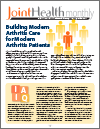In this issue
- Building Modern Arthritis Care for Modern Arthritis Patients
- IA "IQ"
- The "Window of Opportunity": The foundation of modernizing IA care in Canada
- What is an Inflammatory Arthritis Model of Care?
- Developing Models of Care for Inflammatory Arthritis

It is estimated that one million Canadians live with inflammatory types of arthritis (IA). The most common forms include rheumatoid arthritis, psoriatic arthritis, ankylosing spondylitis, lupus and juvenile idiopathic arthritis. In 2015, the way people living with IA access and receive healthcare wildly varies across Canada. This disparity leads to frustration and disappointment for tens of thousands of patients whose very lives depend on getting accurate diagnoses, timely access to rheumatologists, reimbursement for medications, among other critical elements of a proper "model of care" for IA.
Arthritis Consumer Experts (ACE) and its numerous community partners in the Arthritis Alliance of Canada have contributed towards the development of "A pan-Canadian Approach to Inflammatory Arthritis Models of Care" to improve the way health care is delivered to patients with IA by the health policy decision makers, rheumatologists, allied health professionals and other health care providers who care for them. The campaign to modernize and unify inflammatory arthritis care is one of the most significant initiatives the arthritis community in Canada has undertaken.
In this issue of JointHealth™ monthly, we take a close look at this proposed model of care and what it means for consumers and patients on their journey to get diagnosed and receive quality treatment and care for their disease state.

Inflammatory arthritis (IA) is a term used to describe autoimmune forms of the disease. In these disease types, the body's own immune system goes haywire and produces an abundance of inflammatory cells that begin attacking healthy joints and tissues, causing permanent damage to all affected joints.
According to the Arthritis Alliance of Canada, rheumatoid arthritis (RA) is the most common inflammatory arthritis in Canada, with 1 in 100 Canadians living with RA. If un- or under-treated, RA can cause significant disability: within 10 years of the disease starting, up to 50% of people living with it are work disabled. While RA affects all ages, more than one half of all new cases are diagnosed between the ages of 40 and 70 years. Inflammatory arthritis kills, something that a lot of doctors and policy makers are afraid to say; but it's the truth. RA related inflammation in the arteries results in an increased risk of dying. On average, the life expectancy of someone with RA is 10 years less than the general population.
Psoriatic arthritis (PsA) occurs in roughly 0.5% of Canadians and 30% of patients with psoriasis, a chronic dermatologic condition. It may cause severe destruction to the peripheral joints as well as the spine.
Ankylosing spondylitis (AS) is a disease primarily affecting the spine but also peripheral joints and tendonous insertions of the bone (enthesitis). Approximately 1% of the population suffers from axial and peripheral ankylosing spondylitis. It is three times more common in men than women and commonly begins in teenage or early adult years of life.
Juvenile idiopathic arthritis (JIA) affects roughly 24,000 children in Canada from birth to age 18 years. It is important for Canadians to recognize that children do get arthritis and that the disease results in lifelong functional and social limitations that affect education, work and social interactions.
The foundation of modernizing IA care in Canada
Canadian research has shown that diagnosing IA early and starting patients on disease modifying anti-rheumatic medications (DMARDs) right away after diagnosis will better control the diseases, help prevent disability and reduce premature deaths. DMARDs are medications used to treat IA and other rheumatic conditions by suppressing the immune system to reduce inflammation and slow disease progression. Studies also show that in treating RA, a delay of more than 12 weeks from symptom onset to therapy initiation results in a lower chance of going into remission and an increased chance of progressive joint damage.
Early referral for diseases such as RA and AS can lead to early diagnosis and treatment with better long-term results helping to decrease pain and swelling, maintain joint structure and function and prevent permanent disability and loss of employment.
The growing societal burden of arthritis in Canada will continue to strain the healthcare system's ability to provide quality care to patients. To make matters worse, the number of rheumatologists in Canada is already not enough to provide timely care to patients. There are approximately 420 rheumatologists in Canada. Without an increase in that number, nothing short of magic will help the current number mange the expected caseload as the growing percentage of the population living with IA grows dramatically in the next 20 years.
The ACE community and people living with IA who visit our web site or interact with us through social media consistently request evidence-based information to enable them to have more satisfying conversations with their rheumatologist or other health care provider around available treatments, good disease information and self-management practices. Many also reveal they are not fully communicating their treatment goals and/or concerns, especially when it comes to medications.
ACE believes a modern model of care for inflammatory arthritis has the real potential to promote and support good communication between patients and their doctors and forge a true partnership that results in better treatment and results for the patient. To successfully modernize health care, all stakeholders need to understand and agree from the start that patients are the most important members of the healthcare team.
But building a modern model of care also requires patients to modernize as well. Equipped with the most current evidence-based information, IA patients need to be able to appropriately frame their health concerns and questions, set treatment goals and facilitate productive two-way conversation between themselves and their rheumatologist (or other health care provider).Patients who are well informed and feel prepared are more comfortable raising concerns and fears with their doctors and are more likely to be satisfied with the delivery of their arthritis care.
|
"Our job is to help patients move from feeling confused, alone and rushed to having a workable treatment plan, feeling like they are partners with their healthcare team and more in control of their IA." Cheryl Koehn, Founder and President of Arthritis Consumer Experts and a person living with RA. |
What is an Inflammatory Arthritis Model of Care?
To understand more fully the model of care framework, ACE spoke to Dr. Dianne Mosher, who together with Dr. Vanadana Ahluwalia, Dr. Michel Zummer and the late Dr. Cy Frank, was one of the lead authors of the "Pan-Canadian Approach to Inflammatory Arthritis Models of Care," released by the Arthritis Alliance of Canada.
|
Models of care are very important for chronic diseases such as inflammatory arthritis because they facilitate early efficient diagnosis and delivery of holistic health care services, help in the realignment of existing resources to optimize health system efficiencies, and identify the need for new resources. Arthritis patients require an integrated team-based approach to care that includes a number of health care providers over a period of time. Dr. Diane Mosher, Professor of Medicine and the Chief of the Division of Rheumatology at the University of Calgary |
For more information on the Arthritis Alliance of Canada and its recommended key principles for the assessment and management of RA and other inflammatory arthritis conditions, please visit this website.
Developing Models of Care for Inflammatory Arthritis Patients
Please review the diagram and glossary to help you understand how IA patients relate to the key elements in the development of a Pan-Canadian Approach to Inflammatory Arthritis Models of Care.
 How does a Model of Care help people with IA before they get very sick and disabled?
|
ArthritisID is the most comprehensive free arthritis app for consumers, featuring the most current, evidence-based arthritis information to help detect, treat and manage arthritis. bit.ly/GetArthritisID |

 Getting expert care
|
Triage is a process of prioritizing the treatment of patients based on the urgency of their disease. Triage allows for timely intake of new patients while ensuring the ongoing management of long-term patients. |

 Ongoing treatment and care after diagnosis
|
ACE provides disease spotlight information at www.jointhealth.org and specific information on medication and treatment options in its annual JointHealth™ Medications Guide. |

 Team-based care
|
IA patients have complex medical needs that require access to care for the management of disease and complications, the management of co-morbidities, and education and lifestyle management. |

 Taking care of yourself
|
Self-management is about making positive and healthy lifestyle choices, understanding the importance of adherence, and acknowledging and addressing the physical and emotional effects of arthritis. |
Listening to you
We hope you find this information of use. Please tell us what you think by writing to us or emailing us at info@jointhealth.org. Through your ongoing and active participation, ACE can make its work more relevant to all Canadians living with arthritis.
Update your email or postal address
Please let us know of any changes by contacting ACE at info@jointhealth.org. This will ensure that you continue to receive your free email or print copy of JointHealth™ monthly.
Arthritis Consumer Experts (ACE)
Who We Are
Arthritis Consumer Experts (ACE) provides research-based education, advocacy training, advocacy leadership and information to Canadians with arthritis. We help empower people living with all forms of arthritis to take control of their disease and to take action in healthcare and research decision making. ACE activities are guided by its members and led by people with arthritis, leading medical professionals and the ACE Advisory Board. To learn more about ACE, visit: www.jointhealth.org
Acknowledgements
Over the past 12 months, ACE received unrestricted grants-in-aid from: AbbVie Corporation, Amgen Canada, Arthritis Research Canada, BIOTECanada, Canadian Institutes of Health Research, Celgene Inc., Hoffman-La Roche Canada Ltd., Janssen Inc., Pfizer Canada, Sanofi Canada, UCB Canada Inc. and the University of British Columbia. ACE also receives unsolicited donations from its community members (people with arthritis) across Canada.
ACE thanks these private and public organizations and individuals.
Disclaimer
The material contained on this website is provided for general information only. This website should not be relied on to suggest a course of treatment for a particular individual or as a substitute for consultation with qualified health professionals who are familiar with your individual medical needs. Should you have any healthcare related questions, you should contact your physician. You should never disregard medical advice or delay in seeking it because of something you have read on this or any website.
This site may provide links to other Internet sites only for the convenience of World Wide Web users. ACE is not responsible for the availability or content of these external sites, nor does ACE endorse, warrant or guarantee the products, services or information described or offered at these other Internet sites.
Although the information presented on this website is believed to be accurate at the time it is posted, this website could include inaccuracies, typographical errors or out-of-date information. This website may be changed at any time without prior notice.
